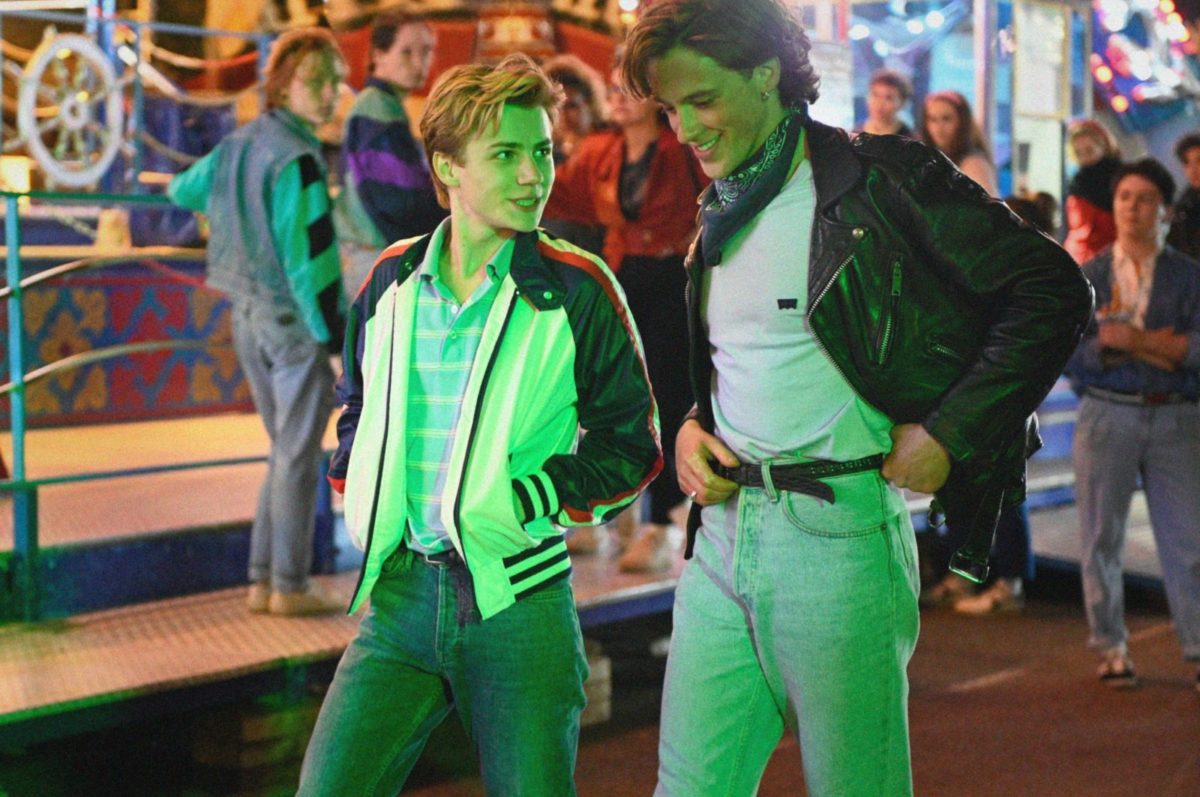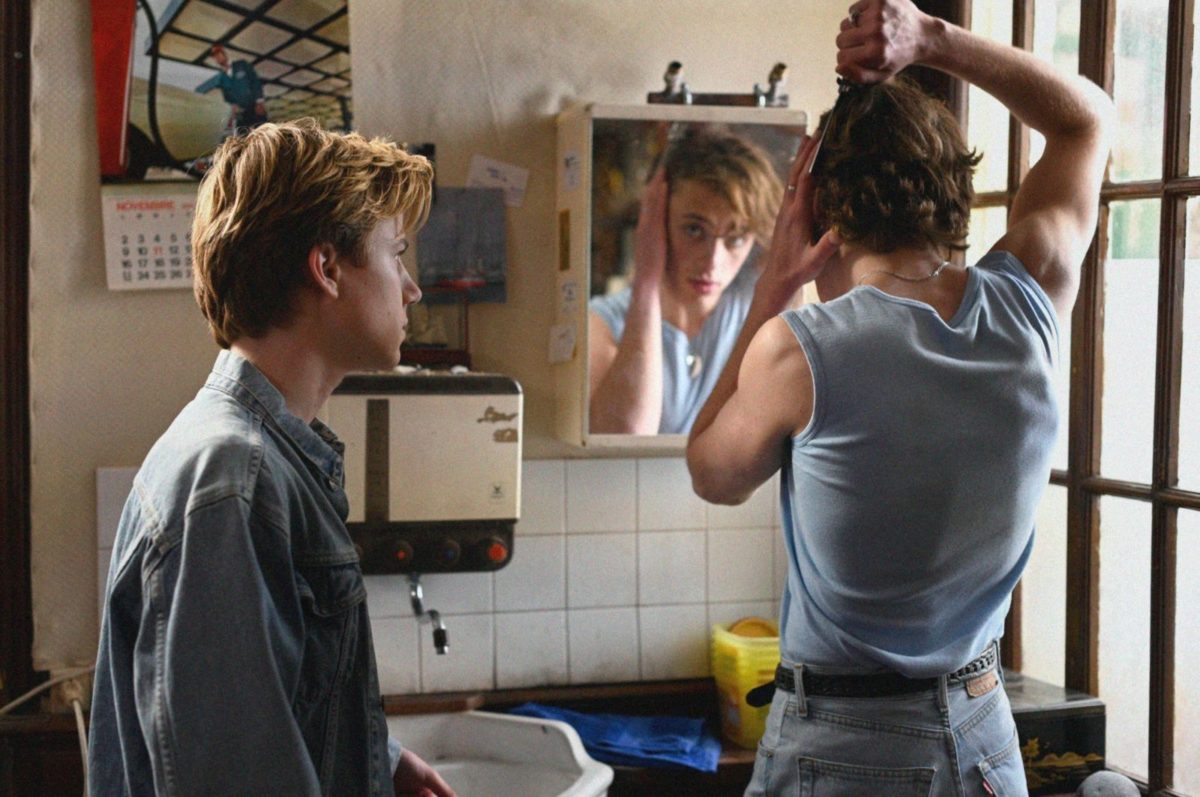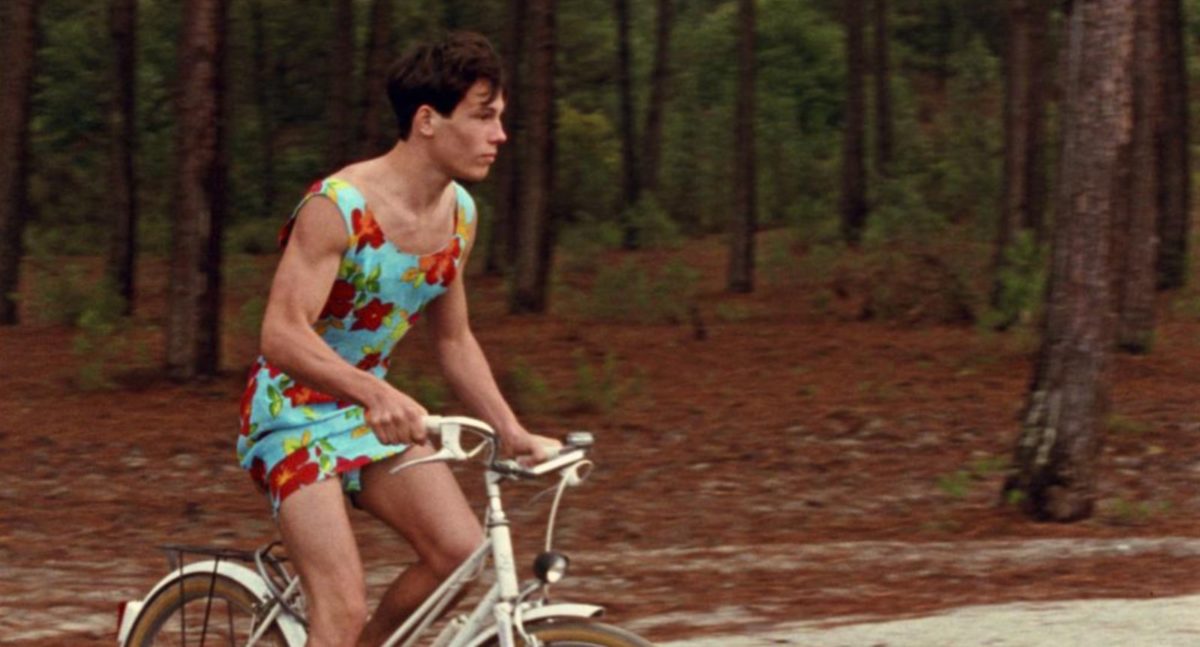François Ozon wanted to see Summer of 85 on screen for thirty years. He expected someone to turn Aidan Chambers’s book Dance on My Grave into a movie when reading it as a teen, but that never happened. When the opportunity presented itself, the French filmmaker jumped at the chance to make a movie he would have loved to watch when he was seventeen. Summer of 85 follows Alexis (Félix Lefebvre), who meets David (Benjamin Voisin) when a sailboat he borrowed capsizes during a storm. David sails in to save Alexis and the two set off on a summer love affair captured in earthy 16mm and dappled in neon light.
We spoke with François Ozon shortly after his other new film Everything Went Fine was chosen for this year’s edition of the Cannes Film Festival. Because we go into fine details about Summer of 85, proceed with caution if you haven’t watched it yet. Ozon tells us how The Cure’s Robert Smith forced him to change the film’s original title and how the threeway between River Phoenix, Keanu Reeves, and Udo Kier in My Own Private Idaho inspired a scene that didn’t make it into the movie. We also discuss a costume from Ozon’s short A Summer Dress that reappears in Summer of 85.
The Film Stage: Congratulations on being selected for Cannes again with Everything Went Fine. What can you tell us about the film?
François Ozon: I’m very happy to go back to Cannes because, you know, Summer of 85 was supposed to be in Cannes last year, but because of the pandemic it didn’t happen. So I’m happy to go to Cannes this year. It’s a very different film. It’s an adaptation of a book of a friend who died four years ago about her relationship with her father.
What did reading Aidan Chambers’s book Dance on My Grave do for you as a teenager?
I think it was exactly the story I wanted to read as a teenager, and I would have loved to see this story on the big screen as a spectator when I was seventeen. I was totally in love with the book, with the story, and I was dreaming an American director would make it and it never happened. So when I became a known director, I decided to make it myself.
The first time I watched Summer of 85, I was taken in by the clothes, 16mm film, and the actor’s beauty. The second time it made me sad because I understood David and Alexis were not “dancing to the same music” in life. How do you create scenes that evoke pleasure and then dread when reconsidered?
I think there is a kind of melancholia in the film and a kind of disillusion, because I follow the point of view of Alexis, who is dreaming of his life and is discovering, during this summer, reality. He was dreaming of the charming queens and he realized the charming queen doesn’t exist. And that’s all the sadness, but at the same time is having very strong feelings. It’s very exciting. The period of adolescence is strong because it’s the first time you discover many feelings, and there are a lot of ups and downs. That’s what I wanted to show, you know—to make the film with the naive point of view of a young teenager who is discovering life, love, and death.

How important is the class difference between David and Alexis? Alexis is awed by David’s freedom and bothered by David’s mother’s openness.
Yes, it’s important because Alexis is coming from the working class and David is not the big bourgeoisie but the small bourgeoisie. Alexis is surprised by the behavior of David’s mother. She’s totally a strange, strange woman, very different from his own mother. So there is very often when you are a teenager, you think other families are better than your own family. And you are charmed by the family of your friends. That’s a little bit of the case with Alexis.
Benjamin Voisin plays David as mischievous. He opens up Alexis but can’t reciprocate the openness. Why does David turn love into a game?
I think David has the most important experience of life: his father died and he wants to take advantage of life. He’s very romantic, like a young James Dean—he likes speed, he likes danger, is afraid of nothing, and is a romantic hero. But you understand at the end of the film that the story was written by Alexis, that maybe Davis is not exactly a real person. As Kate (Philippine Velge) said to Alexis, “we invent the people we love.” So maybe David is a little bit bigger than life.
Will you talk about how Jewish funeral rites complicate how Alexis mourns David?
It comes from the book. I asked Aidan Chambers why he decided to choose that, and he said the story happens in a small city in the west of England where there is a big Jewish community and he felt it was important for the story to have these Jewish roots. Jewish rituals about death are so different from Catholic. The fact you can see the body in Catholicism and all the things about the grave. It was good for his story. But I like it’s not an issue with the fact David’s Jewish—it’s not so important. Like the fact the boys are gay, it’s not so important. They could be straight. It could be two girls, one boy or girl; the story’s universal. That’s what I enjoy in the book.
Will you talk about selecting songs from The Cure and Rod Stewart for the movie?
I was a big fan ofTthe Cure when I was a teenager, and I think the movie’s theme is a mix of my own memories, of my 80s, and my time as a teenager. The book is a mix of the two and I was listening to a lot of English pop and New Wave music at this time. So it was very important for me to have this song by the Cure, “In Between Days.” The funny thing was the first title of the film was Summer of 84, which was when I was 16 years old. When we asked the Cure to have the rights of the song, they said we can’t give it to you because the song was released in Europe in 1985. So I decided to change the title of my film to have the song. It was funny to have this conversation with Robert Smith; I was a big fan of his. The song “Sailing” by Rod Stewart comes from the 1970s, actually, and we were thinking but maybe because David’s father was a sailor, it was maybe his favorite song. It’s more the song of David’s parents’ generation.
Alexis begins writing his story with having sex with David, but you choose restraint by not showing it. Why did you leave it to our imagination?
Because we are seeing from the point of view of Alexis, and Alexis is very romantic. He loves sex, of course—it’s a big discovery—but he’s more describing feelings than sex. If the story was from David’s point of view, you would have seen more, but it’s Alexis’s point of view. Actually, during the shooting, we had a sex scene, but I decided in the editing room to cut it because it was not good enough. It was too funny.
How was it funny?
I had in mind the sex scene from My Own Private Idaho with River Phoenix and Keanu Reeves making love with Udo Kier. Okay. They don’t move; it’s just, like, pictures. We tried to make something like this but it didn’t work because the two boys were laughing all the time. So it was ridiculous. So I canned it.
The social worker tells the magistrate Alexis and David were fighting over a girl, presumably Kate. Who told the social worker that story?
I like that the adults don’t understand what happened. We, the audience, know exactly what is the story. But the adults don’t understand it was a love story between two boys. I like this irony because the spectator had another experience. You can see, at this moment, Alexis looks at Kate and you understand that maybe Kate does invent a story to protect a friend.

Will you talk about the use of mirrors in the movie? David often looks more beautiful and idealized in the mirror than he does in the straight-on shot.
That’s your opinion. [Laughs]
I guess you’re right. [Laughs]
The mirror comes from the book. It’s part of a teenager’s story because, when you are young, you are looking for your identity. In the mise-en-scène it’s a good way to express the fact young people want to know who they are. They are searching for their own identity. So the mirror is a good, so good element to tell.
Is Alexis wearing the same dress that Luc wears in A Summer Dress?
Exactly. Yes, it’s the same. Bravo! I kept it as a treasure. That’s great, because it’s a secret dress that can make miracles.

Still from A Summer Dress.
What can you tell us about your new film Peter von Kant?
It’s an adaptation of Fassbinder. It’s my own vision of The Bitter Tears of Petra von Kant, something totally different but close to Fassbinder. But it’s a surprise! You’ll see. I’m finishing it but it’s not yet finished.
Summer of 85 opens in theaters on Friday, June 18. See more here.
